 loading
loading
featuresNo time to loseYale Law students and alumni raced the clock to help travelers after the executive order on immigration. MelindaBeck ’77, a longtime Wall Street Journal editor and columnist, is a freelance writer in New York City. 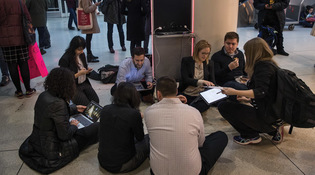 Victor BlueVolunteer lawyers with the nonprofit International Refugee Assistance Project, co- founded and directed by Rebecca Heller ’10JD, gathered to help detainees. View full imageMichael Wishnie ’87, ’93JD, was just leaving a Celtics game in Boston when he got the emergency phone call. It was Friday night, January 27, and President Donald Trump’s executive order barring refugees and halting immigration from seven mostly Muslim countries was only a few hours old. Rebecca Heller ’10JD was on the phone. A former student of Wishnie’s, and director of the nonprofit International Refugee Assistance Project, she had learned that an Iraqi man her group was helping had been separated from his family at Kennedy Airport and detained—despite having a valid visa and a history of aiding US military forces. Justin Cox ’08JD, a staff attorney at the National Immigration Law Center and another Wishnie student, was also on the call. He suggested filing a habeas corpus petition on the detainee’s behalf. But they needed their former mentor’s help to do it. 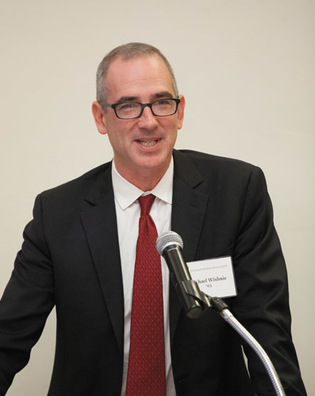 Harold ShapiroMichael Wishnie ’87, ’93JD, oversees the Worker and Immigrant Rights Advocacy Clinic, and several other free legal clinics, at the Yale Law School. View full imageWishnie, a deputy dean at the Yale Law School, oversees 13 free legal clinics, staffed by law students, for people who need lawyers but can’t afford them. One of those is WIRAC, the Worker and Immigrant Rights Advocacy Clinic. “We talked for a while,” he recalls, “and it was clear that someone needed to file a lawsuit for this man, and that it should be a class action if it was going to help others like him who might be trapped in airports.” From the back of a cab, he sent an e-mail blast to the WIRAC students in New Haven, asking for volunteers. With that, a network of current and former Yale Law School students started mobilizing to challenge the order in federal courts and assist detained travelers all over the United States. Students in New Haven worked around the clock researching and drafting motions. Alumni—many of them veterans of WIRAC now working for civil rights organizations—helped organize the volunteer lawyers gathering at airports. Heller dubbed them all “the Michael Wishnie version of Dumbledore’s Army.”
Within an hour, eight WIRAC students and four supervisors were working on the case by e-mail and phone from different locations. Wishnie, Heller, Cox, and Cecillia Wang ’95JD, deputy legal director of the ACLU, helped strategize. The problem was fast unfolding as border patrol agents began enforcing the new order. Fearing that detainees might be summarily sent home, Wishnie told the group it was critical to file the motions before the first planes started leaving JFK. That would be just a few hours away. As Wishnie described it later: “By midnight, we knew we had to write a habeas petition with nationwide class action allegations, research and draft a motion for class certification, and get them on file before 6 a.m.” 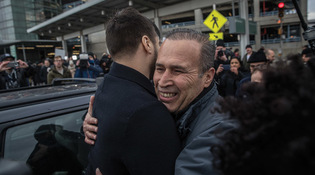 Victor BlueHameed Khalid Darweesh, who had worked as an interpreter for the US Army in Iraq, was released from detention the same day the habeas corpus petition was filed. View full imageThey had help from another Yale law graduate and clinic alum, Jonathan Polonsky ’82JD. Polonsky had spent months working pro bono with Heller’s group to secure visas for the Iraqi detainee, Hameed Khalid Darweesh, and his family. He had gone to JFK that night hoping to welcome the Darweeshes to the United States. But while his wife and children were allowed through customs, Hameed had been detained and not allowed to communicate with anyone. As he waited anxiously with the family, Polonsky became a resource for the students, supplying critical details for their habeas petition—including Hameed’s work as an interpreter for the Army’s 101st Airborne Division in Iraq, which had made him a target for roving jihadists. At 5:30 a.m., the team filed the motions electronically in Brooklyn federal court. The names of 21 lawyers and law students were listed on the petition Darweesh et al. v. Trump et al. It requested a court hearing and summarized Darweesh’s ten years of dangerous work on behalf of US forces. It also detailed the critical legal point: that preexisting US laws had authorized the lengthy vetting process he went through to secure his and his family’s visas. Filed on behalf of Darweesh, along with one other detained Iraqi and “all others similarly situated,” it declared: “Because the executive order is unlawful as applied to Petitioners, their continued detention based solely on the executive order violates their Fifth Amendment procedural and substantive due process rights.” Shortly after the motions were filed, the team had a revelation: it was Saturday. The court was closed. “The only way to get a judge’s attention was to file a motion for emergency relief, which we hadn’t done,” Wishnie says. “These students, who’d been up all night, starting drafting a motion for a nationwide emergency stay of the deportations.” By then, many of the students had converged on a basement office in the Law School. They were joined during the day by a dozen more clinic interns, some bearing bagels, coffee, and Yorkside Pizza. They filed another brief, 25 pages long, just after 4:00 that afternoon seeking an emergency stay of all deportations. Meanwhile, news had been spreading fast that hundreds of immigrants were being detained at international airports around the country. Crowds of protesters started gathering. So did attorneys volunteering to help, including Yale Law alumni. The growing ranks of students in the basement converted their habeas petition into a template that other lawyers could use on behalf of other detainees. Says Cox: “We started sending it to everyone. People took that template and added their own facts and started filing them all over the place.” At the airports, groups of lawyers clustered in seating areas or restaurants, or simply sat on the floor, typing furiously on their laptops. They had to find many of their clients themselves, because detainees were held incommunicado. “Border Patrol was not providing any information,” recalls Caitlin Bellis ’14JD, a WIRAC veteran who went to Los Angeles International Airport. “So we wandered up and down the line of relatives waiting for people to arrive, and looked for those who looked distraught and asked if we could help them.” At Chicago’s O’Hare airport, Swapna Reddy ’16JD coordinated the lawyers, interpreters, social workers, food vendors, and others who offered their services: she created a listserv, organizing the volunteers into three daily shifts. The original 60 names grew to 1,400, and they ultimately helped more than 210 travelers from more than 30 countries. Among them were a Syrian woman who was not allowed to visit her sick mother in the United States, and a Chicago man who waited hours for his brother to arrive from Iran—only to learn he’d been returned to Jordan. By mid-afternoon, customs officials at JFK released Hameed Darweesh and allowed him to join his family. No explanation was given. The other named plaintiff, Haider Sameer Abdulkhaleq Alshawi, was also released on Saturday without explanation. But because Wishnie had thought to file the habeas petition for an entire class of detainees, it remained alive—a means to assist hundreds of other families and individuals.
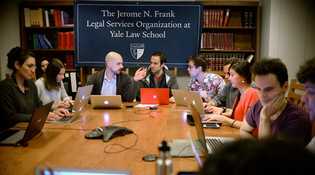 Jessica HillStudents and advisers conferred on the travel ban in a conference room at the Law School on January 30. View full imageAround 6:00 p.m. on the 28th, Judge Ann Donnelly, the emergency judge on call, scheduled a hearing on Darweesh et al., to be held at 7:30 p.m. in Brooklyn federal court. Wishnie was still in Boston, and the students and other supervisors were in New Haven. But the ACLU lawyers working on the case were in New York. They went to Brooklyn to argue the first legal action against the executive order. At 9:00 p.m., Judge Donnelly entered an order forbidding the removal of any persons with approved refugee applications, holders of valid visas, “and other individuals . . . legally authorized to enter the United States.” Says Wishnie, “Someone took a picture of the order with an iPhone. That immediately went out, and all over the country, lawyers began holding their iPhones up to border patrol agents, saying, ‘See—you can’t take that person away.’” In the Law School basement, the WIRAC students celebrated briefly—until they started to get reports that some detainees were still being put back on planes. In one case, an Iranian woman—a Fulbright scholar pursuing a PhD in the United States—had been put on a plane departing JFK at 1:00 a.m. It had already left the gate. The students frantically called the airline, the control tower, Border Patrol, and the TSA. “We don’t know what worked, but in the end, it did work,” says Muneer Ahmad, a clinical professor who co-teaches WIRAC. “We heard that the plane was being turned around and sent back to the gate.” Cheers erupted in the basement. Other travelers weren’t so lucky. At Dulles, two brothers from Yemen were en route to join their father in Flint, Michigan. They were taken off the plane in handcuffs, coerced into signing a form withdrawing their visa applications, and sent back to Ethiopia, according to a lawsuit filed in federal court in Virginia. “Their signatures were not voluntary. They were told they would be unable to reenter the US for five years if they didn’t sign,” says Simon Sandoval-Moshenberg ’08JD, an attorney with the Legal Aid Justice Center. “Unfortunately, this story is not rare. It was representative of what was happening to people at airports all over the country.” Sandoval-Moshenberg filed a suit with Paul Hughes ’08JD and Andrew Pincus ’77, both partners at Mayer, Brown. They obtained a court hearing, which drew national attention when government lawyers told Judge Leonie Brinkema that more than 100,000 visas had been cancelled as a result of the executive order. (The State Department later placed the total at 60,000.) The attorneys for the two brothers negotiated a settlement that allowed them to return to the United States with their visas reinstated. It’s not known how many travelers were detained or sent back. But, says the ACLU’s Cecillia Wang, “without that army of Yale law students working in the basement, it would have been a very different story. I don’t think there would have been a halt to the removals that were happening that night.”
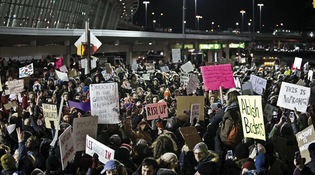 AP Images/Seth WenigDemonstrations against the travel ban at John F. Kennedy International Airport in New York. View full imageAt one point during the first crucial 24 hours, as she was conferring with the students by phone, Wang told them: “You know, 20 years from now, you’re going to remember this moment the way Mike and I remember Team Haiti.” Wang was referring to another time when Yale law students challenged a president’s order on immigration. In the early 1990s, thousands of Haitians fled their country on small boats, risking a dangerous trip to Florida in order to escape a military coup. The Bush administration ordered the US Coast Guard to intercept them and held many at the US Naval Base at Guantánamo for processing. Others were returned directly to Port-au-Prince. A group of Yale law students, led by law professor Harold Hongju Koh, argued that the refugees were being denied due process. Aspects of the complex case went to the Supreme Court eight times; the high court eventually ruled that refugees intercepted on the high seas could be returned. But Yale’s “Team Haiti” did win the release of 240 HIV-infected Haitians being held indefinitely at Guantánamo. (Koh, who served as law school dean from 2004 to 2009 and legal adviser to the State Department from 2009 to 2013, is now Sterling Professor of International Law at Yale.) “Cecillia and I cut our teeth on that case,” says Wishnie. He went on to work on immigrant rights at the ACLU and to teach at New York University. But he returned to Yale in the fall of 2006 to launch the WIRAC clinic—just as two immigration cases in Connecticut were making news. In one, a police officer had posed as a contractor, pretended to hire a group of Ecuadoran day-laborers in Danbury, and then delivered them to authorities. In the other, legal workers from Guatemala were allegedly being brutally treated at a large nursery near Hartford. The clinic didn’t officially begin until the spring, but students were eager to get involved. Among them were Cox, Hughes, Sandoval-Moshenberg, and Marisol Orihuela ’08JD (now one of WIRAC’s supervisors). A clinic professor “e-mailed a bunch of students and said, ‘Anybody want to work on this?’” Wishnie remembers. “Simon walked into my office and said, ‘I’m here to free the Danbury 11!’” The students achieved major settlements in both cases. Many of them went on to work in human rights law, and WIRAC became one of the law school’s hottest clinics. WIRAC has a reputation for letting students take the lead in all aspects of litigation, from writing briefs to taking depositions to making oral arguments. Wishnie says he and Ahmad “trust our students deeply. We prepare them aggressively, and they consistently astonish us in their ability to practice law.” Together, the 13 clinics he oversees make up the Jerome N. Frank Legal Services Organization. Although it is part of the Law School, LSO operates like an independent law firm, and even has its own separate entrance for client privacy. Students who work at the clinics “get experience as a litigator and advocate that might take you ten years in a more traditional setting,” says Reddy, who argued a case before a three-judge appellate panel while in law school and has since founded the nonprofit Asylum Seekers Advocacy Project at the Urban Justice Center in New York City. “To have that kind of exposure early on inspires people to stay involved.” Heller adds: “Mike has a lot of short-term plays, but one long-term play is to train generation after generation of fierce advocates to go to the wall to seek justice for immigrants and refugees. What’s happening now is a perfect example.”
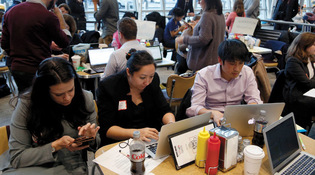 Rex Features via AP ImagesVolunteer lawyers work to help free travelers detained at JFK. View full imageYale alumni and faculty also played key roles in the Ninth Circuit Court ruling that upheld an earlier stay of the executive order by a Seattle judge. Hughes and Pincus spearheaded the amicus brief, signed by more than 100 tech companies, arguing that the immigration ban threatened their ability to attract talent and investment. Koh and students in his Rule of Law clinic—formed after Trump’s election victory—recruited former secretaries of state and intelligence chiefs to sign a declaration and an amicus brief calling the order unnecessary and detrimental to national security. In addition, Richard Clifton ’75JD was part of the Ninth Circuit panel that unanimously rejected the Trump administration’s appeal. The administration rolled back aspects of the executive order: green-card holders were belatedly exempted. But as this article goes to press, the final outcome is unknown. The Brooklyn court has ordered the government to provide a list of all those who were detained or sent back. A number of other cases remain in federal courts. And the Trump administration said it was planning to issue a new executive order that would survive any legal objections. Many underlying questions have yet to be answered: does the order amount to a ban on Muslims? Are foreign nationals not yet in the United States entitled to due process under the Constitution? Does the president have unlimited authority to set immigration policy, or must it be grounded in facts? At Yale, more than 1,000 students and community members attended a candlelight vigil on Cross Campus. Yale and 16 other universities filed an amicus brief in the Darweesh case, stating that the restrictions threaten their ability to attract international students and scholars. Some 15 Yale students and 18 Yale researchers from the designated countries are now in the United States on non-immigrant visas, according to Yale’s Office of International Students and Scholars. “If something happens at home they’d have a hard decision to make,” says OISS director Ann Kuhlman, “because they might not be able to return.” While the Yale community is rarely unanimous on anything, support for President Trump’s executive order was hard to find on campus. Numerous conservatives and conservative organizations did not respond to requests for comment. A few Yale-trained legal scholars told media interviewers they thought the Supreme Court could rule at least partially in Trump’s favor. Harvard professor emeritus Alan Dershowitz ’62LLB said in an e-mail that he strongly opposes the order on policy grounds, but believes some parts of it are constitutional: “The constitution gives no rights nor standing to foreigners who have no connection, presence, or status with regards to the US. Nor does it constitute an impermissible establishment of religion to specify countries that have a high risk of terrorism that also happen to be majority Muslim countries.” Koh points out that the Law School has a long history of intervening at times of critical legal change in the nation. Law students and faculty filed briefs in Brown v. Board of Education (1954), the Pentagon Papers case (1971), and Griswold v. Connecticut (1965), which held that the state could not outlaw the use of contraceptives. The Law School also barred US military recruiters from its annual jobs fair (though not from campus) when they were refusing to interview certain students based on sexual orientation These moves have incurred the government’s wrath, and sometimes caused friction within Yale itself. But Koh is proud of the Law School’s record. “It’s the job of elite institutions to press for equal justice,” he says. “This is part of our Yale tradition.”
|
|
1 comment
-

Martha werman, 12:53am March 23 2017 |  Flag as inappropriate
Flag as inappropriate
The comment period has expired.So impressive. Wish I had the education and organization to do something so important for others in trouble. This was an extraordinary effort on behalf of many. Thank you!